|
|
|
Sort Order |
|
|
|
Items / Page
|
|
|
|
|
|
|
| Srl | Item |
| 1 |
ID:
182405
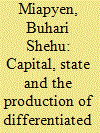

|
|
|
|
|
| Summary/Abstract |
This paper re-visits secondary literature on racial capitalism and problematises the Nigerian oil-dependent capitalist economy. The economy of oil extraction dispossesses the peasants of their land and exposes them to pollution. This Oil economy creates a contradiction by producing the agent of its transformation; the community-based social movements. The state and the capital respond to these contradictions by instrumentalizing differences to prevent communal solidarity. Consequently, the indigenous people are racialised as a minority people and within the oil-producing region as sub-ethnic communities. The absence of communal solidarity promotes unmitigated environmental disaster, state hegemony and high returns for the capital; local and global in Nigeria.
|
|
|
|
|
|
|
|
|
|
|
|
|
|
|
|
| 2 |
ID:
184298
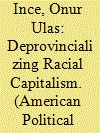

|
|
|
|
|
| Summary/Abstract |
Recent literature on racial capitalism has overwhelmingly focused on the Atlantic settler-slave formation, sidelining the history of European imperialism in Asia. This article addresses this blind spot by recovering the aborted project of British settler colonialism in India through the writings of its most prominent advocate, John Crawfurd. It is argued that Crawfurd’s vision of a liberal empire in India rejected slavery and indigenous dispossession yet remained deeply racialized in its conception of capital, labor, and value. Crawfurd elaborated a “capital theory of race,” which derived racial categories from a civilizational spectrum keyed to the capitalist organization of production. His proposals accordingly revamped the conventional terms of colonization by representing India as overstocked with labor but vacant of capital and skill that only European settlers could provide. The article concludes with the broader implications of a transimperial analytic framework for writing connected histories of racial capitalism and settler colonialism.
|
|
|
|
|
|
|
|
|
|
|
|
|
|
|
|
| 3 |
ID:
193310
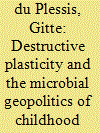

|
|
|
|
|
| Summary/Abstract |
Engaging Catherine Malabou's philosophical work on biological plasticity, this article combines microbiological and geopolitical analysis of the deadliest manifestations of childhood malnutrition. At the scale of microbiology, childhood malnutrition is a devastating condition and a mystery to which it seems microbiomes – the ecosystems of microbes in the gut – hold a key. At the scale of geopolitics, childhood malnutrition is a calamity generated by racial capitalism, poverty, and underdevelopment. What should we do with the plasticity that makes us? Malabou asks. Engaging philosophically with the plastic materiality of microbiomes in childhood malnutrition, the article focuses on destructive plasticity as an ontological alternative to what science on malnutrition pursues as a problem of causality. This leads to an argument that medicine, as well as humanitarian, security, and development interventions, must reckon with the destructive plasticity of what is in essence a political disease of annihilation. The article ends by speculating on resistance via the biological act of nurturing.
|
|
|
|
|
|
|
|
|
|
|
|
|
|
|
|
| 4 |
ID:
178792
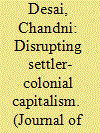

|
|
|
|
|
| Summary/Abstract |
This article explores the resurgence of Indigenous/Palestine solidarity during the Wet’suwet’en land sovereignty struggle in Canada that took place around the same time Donald Trump’s Middle East “peace plan” was released in early 2020. Historicizing this resurgence within a longer period of anti-colonial resistance, the article attends to the distinct historical, political-economic, and juridical formations that undergird settler colonialism in Canada and Israel/Palestine. It contends with the theoretical limits of the settler-colonial framework, pushing back against narratives of settler success, and shows how anti-colonial resistance accelerated economic crises that led both settler states to enter into “negotiations” with the colonized (reconciliation in one case, and peace talks in the other) as a strategy to maintain capitalist settler control over stolen lands. The analysis also sheds light on a praxis of solidarity that has implications for movement building and joint struggle.
|
|
|
|
|
|
|
|
|
|
|
|
|
|
|
|
| 5 |
ID:
174252


|
|
|
|
|
| Summary/Abstract |
This introductory essay contextualizes the special collection of papers on the pandemic and seeks to map the terrain of extant public health research on Palestine and the Palestinians. In addition, it is a contribution in Palestine studies to a nascent yet propulsive conversation that has been accelerated by Covid-19 on the erasure of structures of violence, including those of settler colonialism and racial capitalism, within the discipline of epidemiology. Using public health as an analytic, this essay asks us to consider foundational questions that have long been sidelined in the public health discourse on Palestine, including the implications for health and health research of eliding ongoing settler colonialism. Rather than ignoring and reproducing their violence, this essay seeks to tackle these questions head-on in an attempt to imagine a future public health research agenda that centers health, and not simply survivability, for all Palestinians.
|
|
|
|
|
|
|
|
|
|
|
|
|
|
|
|
| 6 |
ID:
183725


|
|
|
|
|
| Summary/Abstract |
Over the last two decades, the European border regime has become the subject of a growing body of scholarship in critical security studies. In this article, I draw on Stuart Hall’s work on racialized policing, authoritarian populism and conjunctural analysis to argue that this literature has paid insufficient attention to the close relationship between racism, capitalism and state violence. Writing at the dawn of Thatcherism and neoliberal globalization, Hall theorized the growth in repressive state structures as a revanchist response to breakdowns in racial hegemony. Revisiting these insights, the article argues that the ongoing expansion of the European border regime is a hegemonic strategy of racialized crisis management. The imposition of ever more restrictive immigration policies, increased surveillance and heightened forms of deportability are attempts to defend white bourgeois order and to police a (neoliberal) racial formation in crisis. The migrant ‘crisis’ is ultimately the result of one racialized world order collapsing, and another struggling to be born.
|
|
|
|
|
|
|
|
|
|
|
|
|
|
|
|
| 7 |
ID:
177966
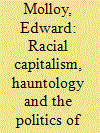

|
|
|
|
|
| Summary/Abstract |
This article explores the ways in which death can be understood to occupy a formative function in the construction of Irish national identity. The analysis of three distinct moments in Irish history (Plantation-era funerary practices, the Great Famine, and the 1981 hunger strikes) is undertaken with recourse to Michel Foucault’s understanding of race as it is deployed through disciplinary and biopower and Achille Mbembe’s concept of necropolitics. The continuing concern with history in Irish political discourse is juxtaposed with Derrida’s idea of ‘hauntology’. It will be seen that the act of remembering politically carries with it an ambivalent legacy, exposing the violence at the heart of the establishment of both states in Ireland, while maintaining the potential of emancipatory promise. This promise is itself rooted in the violence implicated in the production of alterity through the historical experience of death.
|
|
|
|
|
|
|
|
|
|
|
|
|
|
|
|
| 8 |
ID:
182655


|
|
|
|
|
| Summary/Abstract |
The past ten years have witnessed a revival in scholarship on militarism, through which scholars have used the concept to make sense of the embeddedness of warlike relations in contemporary liberal societies and to account for how the social, political and economic contours of those same societies are implicated in the legitimation and organization of political violence. However, a persistent shortcoming has been the secondary role of race and coloniality in these accounts. This article demonstrates how we might position racism and colonialism as integral to the functioning of contemporary militarism. Centring the thought and praxis of the US Black Panther Party, we argue that the particular analysis developed by Black Panther Party members, alongside their often-tense participation in the anti–Vietnam War movement, offers a strong reading of the racialized and colonial politics of militarism. In particular, we show how their analysis of the ghetto as a colonial space, their understanding of the police as an illegitimate army of occupation and, most importantly, Huey Newton’s concept of intercommunalism prefigure an understanding of militarism premised on the interconnections between racial capitalism, violent practices of un/bordering and the dissolving boundaries between war and police action.
|
|
|
|
|
|
|
|
|
|
|
|
|
|
|
|
| 9 |
ID:
192290


|
|
|
|
|
| Summary/Abstract |
This article examines the rearticulation and reconfiguration of US-led imperialism vis-à-vis Tunisia in the aftermath of the 2010–2011 popular revolt. Challenging the prevalent economic-military binary in analyses of US-led imperialism in the region, it treats instead economic intervention in Tunisia as linked to and shaped by ‘security’ intervention, with the violence of the War on Terror laying the groundwork for a new wave of primitive accumulation. Employing conjunctural analysis, it considers how the 2015 attacks, largely targeting European tourists at a Sousse beach resort and the Bardo national museum, were mobilized to further Tunisia’s imbrications within imperialist security architecture through legal interventions, border violence, peripheral militarization, increased ‘security’ spending and neocolonial ‘expertise’, debt and racialized financialization. In doing so, the 2015 security conjuncture reinforced Tunisia’s peripheral status in the international system and enabled further surplus value drain, though not without resistance. The article concludes by reflecting on popular struggles and the current conjuncture, which is characterized not only by public health and economic crises, but also by the rise of a multipolar world order that, when combined with working class organization and mobilization, may provide an opening for Tunisia to delink from the imperialist core. Such a transformation would domore than any platitudes about human rights and ‘security sector reform’ to radically transform the nature of the Tunisian security state and the social relations it is designed to uphold.
|
|
|
|
|
|
|
|
|
|
|
|
|
|
|
|
|
|
|
|
|